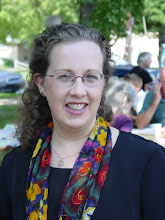I haven't blogged for many moons. Our trip to the Holy Land was wonderful but stressful, and making sure the group was humming along absorbed any extra energy I might've had to post. We returned Tuesday morning, bleary-eyed and grateful for everything we saw and heard and experienced. Just for the heck of it, I went to my blog, and was surprised to read three comments - all supportive and everything. I thank everyone who prayed for us, or thought about us. I thank all of you who have read this blog! It inspires me to do more.
Where to begin? We were a mixed group, of Jews, Catholics and Unitarian Universalists. Sometimes people didn't know what to make of us, didn't understand why we were there, if not a straight-up Christian pilgrimage or a Jewish heritage group. I was probably the most interested in the Biblical narrative of anyone. We were there to hear many different perspectives, Jewish and Palestinian, and to see beauty, history and religious treasures. And, okay, to have fun. Probably the holiest, most God-driven moments were in our struggle to listen to hard things, to a conflict that doesn't show many signs of resolution.
A snapshot: We are driving around East Jerusalem in our comfy, air-con bus, narrated by a charming, scruffy young man from ICAHD, the Israeli Coalition Against Housing Demolition. He says, "We're so far to the left, if you stand in the center, you can't see us." We drive through potholed streets with no sidewalks, run-down buildings whose owners can't get permits to improve, and people whose houses could be demolished at any time - demolitions happen one or two per week. The neighborhood is being marketed as cheap land for internationals and touts an excellent view of the old city. We drive up to the wall, a 20-foot high concrete bruiser that cuts through neighborhoods and separates families, and keeps a lot of people from going to work. It also has reduced the number of suicide bombings to near-zero, and is the reason I felt comfortable enough to even come to this part of the world, let alone take a group. I had to keep remembering this, though I still don't know what to do with it.
So all of this is tough enough. Then we pull up to a parking lot where a family is living in a tent, having just lost their home. They have a big sign up saying "Stop Ethnic Cleansing" so we know they want us to come, and don't mind if we take pictures. There are also ultra-Orthodox Jews pulling up to visit a holy site nearby. I can't say this to my group, but I really don't want to get off the bus. Will there be some kind of confrontation? Will the police show up and chase us off? Can I come face to face with people in such intense suffering? What could we possibly say?
Thank God for peer pressure. We go up, tentatively. There is a sweet, black-hooded grandma that reminds some in our group of a condor. The woman who speaks to us just lost her husband who had a heart attack in the stress of losing their home. She is lovely, with wavy hair pulled back and a dimpled smile. I have seen this before: people trying to explain their situation to us without being "too angry" and scaring us. (I was reminded of the coaching Barack Obama received throughout his life to avoid being seen as an angry black man.)
Later on, we will visit a lovely new synagogue that is led by a Reform rabbi, Kinnaret Shiryon, who happens to also have been the first female Rabbi in Israel. It's in a "new town" called Modi'in. We love the worship, even though it's three hours long and all in Hebrew, including the announcements. We can feel their joy as a community. They celebrate their volunteers doing social justice work. They are one of the few spiritual options for those who aren't Orthodox (the state religion) or "secular". They are liberals like us. And yet we cannot forget what we are told: that Palestinians consider Modi'in a settlement. It's nowhere near the site of the demolished homes we just saw, but we know that the sparkly-clean little town with its pretty park including a giant caterpillar for children to play on came about because Palestinians were kicked off land. In the last few decades.
Afterward, we join their potluck and we mingle. One of our bolder group members asks someone how they deal with the suffering of the Palestinians. The person says quite honestly, "Most of us are in denial."
My Jewish/UU husband (who also calls himself a "Jew-U") is supportive, saying, "I have high expectations for Israel - I want them to live up to their own standards of justice." I'm not sure what stirs my soul about this. As clergy, I am presented over and over with situations where people are in need. I don't really know why this one in particular gets my attention.
I think about Jesus and his ministry with people "with their backs to the wall", as my hero Howard Thurman once put it. He probably didn't see any outward evidence of hope for the Jews living under Roman occupation, either. But he didn't shy away from touching them, healing them, teaching them, and eating with them - knowing he was one of them - and opening his big yap in front of the powerful.
May I have the strength to speak, also.
Saturday, April 11, 2009
Subscribe to:
Posts (Atom)
